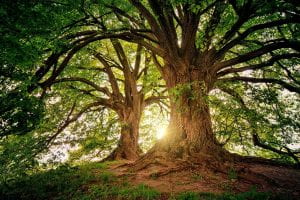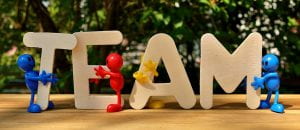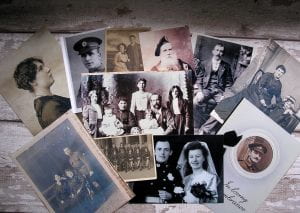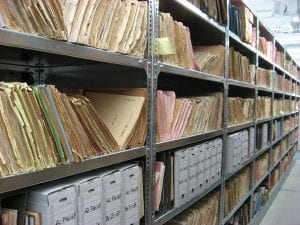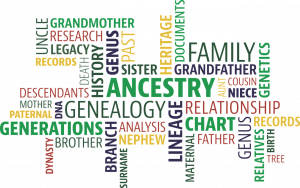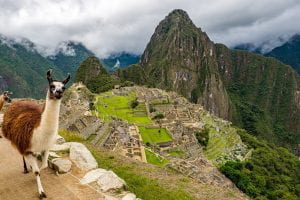Part of the discussion was whether this should be called Cousin Bait as originally mentioned and on the question slides or perhaps a better title was Cousin Collaboration. You can see what I decided by the title of the post. But some answers still use the word bait.
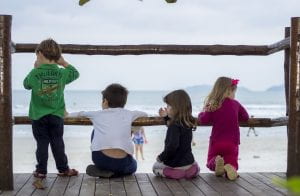
How do you share your family history online? ie blogging, trees, social media?
Also share with immediate family via email as many are older and this is their only online “place”. I have created separate email folders and labels, gmail is good for that – I used to forward emails to Evernote but have dropped back to basic now Evernote’s price has skyrocketed
Yes … agree re gmail … I also make use of folders and labels to organise family history emails from cousins and research contacts etc.
I mainly use blogging for sharing my family history online. I do have an online tree on Ancestry and some other subscription sites. I need to get better at using Facebook I think.
I also print off hard copies of any biographical narratives … they are available to immediate family via a folder on my bookshelf
Does anyone find they get much contact via online trees, either through paid sites or their own? (Other than when DNA is involved)
I get quite a few messages via Ancestry. Most are in response to DNA connections but some are tree related … I do quite a lot of descendant research so have lots of collateral lines in my trees … that helps to prompt tree related messages
I get quite a lot of messages on Ancestry. Not all who contact me are actually related but some have ended up being amazing collaborations! Betsy first found me on Ancestry. Look where that took me!
Just remembered I made some cousin contacts through a local history group on Facebook
I am trying to put my research in as many online places as possible. I am writing biographies on WikiTree and copying them to FamilySearch. I have trees on all the big sites.
I have done the same. Pretty much anywhere my tree can go you’ll find it. I don’t get much interaction anywhere but Ancestry but I live in hope
I’ve had some wonderful people contact me with offers of photos of my grandparents siblings – oooooo!!
I’ve (slowly) come to the realisation that trawling the trees for the cousins themselves (not their data) is a great way to find them and connect. Need to get moving with more of that!
Share my research mainly through blogging then emails once a connection has been made via tree on Ancestry etc
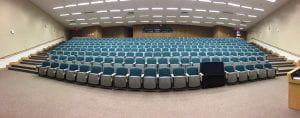
Do you have an intended audience when you share your family history online? Are you looking to collaborate with others?
Sharing my family history online is about telling our stories for future generations, and to encourage older generations to tell their stories.
Encouraging older generations to tell their stories so less history is lost is a great outcome. Takes effort,
We need to write down our own personal memories too so that they become written remembered stories for our descendants
Years ago there was a blogging challenge called The Book of Me. Doing that I recorded much of my childhood experiences. We all need to leave our own for the future
I tend to write mainly for myself (to organise my evidence, thoughts etc. and find the gaps in my research) and for my immediate family so I tend to fly under the radar with my blog
ooh an intended audience…that is such a good question. Well in an ideal world I do try to cite my sources thinking that other family historians would be pretty cranky if I didn’t. But I am hoping to catch cousins too.
I’m a bit naughty when it comes to sources in my blog. I do list these sometimes however it makes the blog post less visually appealing and added work so will go for a “contact me for more info” plus if they are really interested they might contact me
I make use of lots of endnotes
Google alerts are quite useful
I’ve been thinking about audience for the blog lately – some good points here genealogystories.co.uk/how-to-go-from…
@geneastories has lots of good advice about family history story telling (in addition to the linked post above)
My intended audience is mixed. I want to preserve the stories for my family and retain via Pandora. It’s also a way to record my discoveries as a kind of research library
Am finding LivingDNA is getting better with replies to messages and then having to work out how related
I have had an uptake in messages from LivingDNA recently and have been able to connect some by cross referencing to other databases but some are only on LivingDNA and not very forthcoming with detail. Hopefully, it will get easier once trees are added!-?
In the early days of researching I drove for almost two hours to meet up with a cousin who found me through the blog. I gave her all my information and never heard from her again. Learned my lesson then and there
Sometimes it can be very frustrating. I’m talking to a 3C at the mo. (DNA) I’ve connected her to her Irish family, who she did not know, and shared everything with her back to her GGGs. And, she has one birth cert that I’d like, but no…
Ack, that’s disappointing. 🙁 (Which reminds me, I must share some birth certs I ordered recently with a 4th cousin LOL)
I have found my blog is great for non family history contacts. This is because they can Google a name or place and find you if you are fortunate. Even if they are not interested in family history some send a note with a few helpful details.
I mostly share family history information online with the intent to find people related to me. My blog posts are both to record stories and research but I do see them as cousin bait. Tags ensure they are easily found by subject, places, surnames etc
I also wonder about menus and categories. Having a navigation that attracts readers to go deeper takes thought and planning.
I use surnames for categories but I also have a menu for my posts when researching my hard to find Irish great great grandmother
I want to share what I know already and also learn from others. I had huge gaps of knowledge a decade ago and have learnt SO much from wider family members about my ancestors. Always looking to collaborate, as there are still a few mysteries to solve.
My intended audience is just whoever comes after me. I don’t have children and don’t know anybody in the family who would be interested in it, so want to make my research available for the future generations.
Collaboration is best when you can share and exchange with like-minded people. Collaboration doesn’t just flow in one direction.
Not sure if all understand how collaboration works and want information however do not share back
I guess we who have benefited have to model the behaviour we want in others (can you tell I’m staying with my 3yr old grandson just now)
As long as I can catch the cousins then the sharing usually follows!
In the past I have been contacted by people who are only interested in what they can get from me. At first I sent the info and heard nothing more from them. I much prefer collaboration
Intended audience includes (un)known descendants and their collateral lines (latest was the son in law of someone). I’m always willing to collaborate but for the moment, it’s mostly one way as I help with Irish records
I dont write for a specific audience but I do have some followers from UTAS family history who often add comments. Also have some cousins who follow and add info
The audience I target is twofold. Anyone interested in family history that can learn from my experiences and descendants of ancestors. The best contacts are ones with photos. You have to love a photo of a person you have not seen before.

What do you consider is your best source of Cousin Collaboration? ie blogs, trees, social media?
hmmm well over the years it has been online trees followed by my blog but I suspect if I used Facebook more I might get more bites.
I find twitter achieves more blog hits. Probably because more people follow me on Twitter. Also more regular posting on Twitter. Smaller FB audience and a lack of posting does not help
Don’t forget ancestorian.com … It is another avenue for engaging with others in family history research and doesn’t track you like fb does
The best responses I’ve had have been via my blog, especially when I was posting regularly. I think DNA + online trees have also been a good source of contacts from relatives.
The best thing I’ve found with DNA is the cousins who I “know” who help me separate one line from another. Getting specific people to test helps. I’m amazed how the random DNA inheritance will link one person and not others.
Agree, especially when a tree includes collateral lines in it and enables you to better support inquirers to understand where they connect
family trees with a broad base – that is, engage in descendant research to build down the collateral lines.
Undoubtedly, my best source of cousin bait is my blog. We also stay in touch far longer, as they may follow me. They occasionally email comments, and I’m often in their mind if they come across any new family stories, questions or photos. I love it!
My blog is by far the best source of cousin bait for me too Dara. I can’t quite believe the collaboration and information that has come out of blogging
Yes, on a couple of lines I have a long-term collaborator – and it’s so much extra fun to research those lines
I don’t seem to have much luck with this. Maybe I have too few close cousins. I have been in contact with quite distant cousins. Some are interested, many not.
Wherever you put your information there needs to be enough to “reel them in” too little and they move on
By FAR my best source of cousin bait is blogging. But also Twitter. I have put requests for information on Twitter and its amazing how quickly I get results.
I once asked if anyone knew a particular person and within half a day, the granddaughter of the person had contacted me. She gave me photos and information about the house I was researching in return for a copy of the history
For me it’s blogging for sure. Blog posts are out there forever and I’ve been contacted sometimes years after a post is published
Blogging, emails and family reunions are my best sources
the best source for cousin bait is somewhere that will show up in a search engine and free to access so @WikiTreers is my first choice to get someone found
So far Ancestry.com has been the most useful for me. No new cousins have responded on social media, but many have through Ancestry and later through email.
my greatest number of contacts has come through the blog and a few from facebook Aus. bloggers group

What cousin connections or great finds have you made through sharing information online?
The producers of Coast Australia found my convict blog where I had written about my g g g uncle on Norfolk island. Next thing I was researching for them and flown to NI to appear on the episode with Neil Oliver
Forget the cousins! If I knew blogging could get me a meeting with Neil Oliver I’d have been working my little typing fingers down to the bone. Ooh, that voice…
I went to NZ for a holiday, visited a town where some relatives lived, took photos of some photos they showed me, put on blog with question about who were these people. Have had many comments so I can now name the people in photos
Marvellous photos and ephemera from rediscovered cousins in New Zealand, Australia, England and Ireland which aid research on both my paternal and maternal lines. Some people are incredibly generous
I am constantly amazed at people’s generosity Tara when it comes to sharing family history.
What I found was that the diaspora tended to cherish those mementos far more than those who stayed behind
Very true Tara. My grandmother born in Ireland seemed more attached to her mementos than the relatives back home. I guess her way of staying attached.
My very best cousin connection was my dear 3rd cousin Betsy in Chicago. Our g grandparents were sister and brother. She became one of my closest friends and we solved family mysteries together. Since her death this year I have felt quite alone
Have just managed to take husband’s family back one more generation due to an online contact thru Ancestry. We exchanged many emails and documents etc before making the decision it was the correct family
DNA has led me to make connections with quite a few people – mostly we have not yet found our link. They are now friends even though we have not and probably never will meet in person.
Some fab connections, including distant cousin with well-researched family history for a side of the family I had been wondering about. Most memorably, contact from a descendant of a “lost” sibling of my 2x great grandmother, and the research she shared.
My Irish and Bavarian blogs have drawn in people who are descendants of those I’ve written about.
which demonstrates the importance of place I think
I have connected with a number of cousins from 2nd cousins to further afield due to trees, blog, Facebook
I wrote a blog about my husband’s MacDonalds of Ord. A man commented that his g grandfather had been the gardener at Ord house and on a trip to NZ picked up two seeds for a palm. One went to Kew gardens and one to Ord House. The palm at Kew died
I’ve made good friends as well as cousins through blogging. Found unexpected indirect links to genimates. Gained information I’d never have known about.
I was in touch with a cousin who I collaborated with and visited in England many years ago and lost touch. He was much older than me and I was worried he had passed away. He contacted me through the blog this week. I was so happy to hear from him
my great finds have come through someone sharing thru My Heritage and another thru internet stalking followed by letter writing – found the American connection & photographs of my GG grandmother’s brother – the closest I’ll ever get to what she looks like
#ANZAncestryTime A4 My #McLoughlin cousins have been very good at following any posts about my grandfather and naming the brothers correctly in this photo. You can read about them here https://t.co/MbBLQYzFm6 pic.twitter.com/yqEJh1iSmV
— alex daw (@luvviealex) May 25, 2021
Blogs mentioned:
Jane – her own thoughts
Sharn – Sharing her thinking about her conclusion
Hilary – Sharing her stories and research
Readers: How do you make connections for collaborating with other family members?
